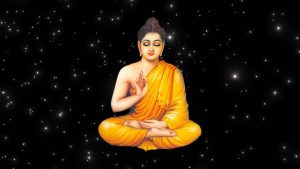📖 The book The Buddha Teaches Once More
🔹 Part 2: Essential Buddhist Teachings
📜 Chapter 16: Clarifying Merit and Virtuous Blessings
People in the world hold vague perceptions regarding Merit and Blessings in Buddhism. This discourse shall provide clarity, allowing us to comprehend that merit and blessings cannot be transferred as commonly believed.
Minh Nguyet: Venerable Buddha, in previous teachings, you expounded on the journey through the six realms of reincarnation, emphasizing that it is an opportunity for sentient beings to cultivate merit and blessings. However, I have yet to fully grasp the distinction between merit and blessings. At times, I have mistaken one for the other.

Merit and blessings are two essential aspects that one must cultivate on the path of moral refinement. One must never be lacking in either.
🔹Merit is the crystallization of the power of action. This power of action encompasses perseverance and the ability to apply wisdom in resolving matters. When we successfully handle an issue, our wisdom is further awakened. As a result, we accumulate merit, which is acknowledged by the enlightened ones above.
The result of the effort spent in seeking the path to liberation is merit. The truths we discover, the knowledge we gain, and the realizations we attain all become our own merit. If we attain partial realization, we accumulate merit in that measure; the deeper our realization, the more immeasurable our merit becomes.
Merit and wisdom always go hand in hand. As we undergo various experiences in life and face numerous challenges, our ability to solve problems is enhanced. Through this process, we gain deeper realizations and elevate our wisdom to a higher level.
🔹Blessings are the fruits of the virtuous deeds we perform and accumulate. Blessings help to awaken our compassionate heart, for everyone possesses the Buddha-nature within, though it remains obscured. The more virtuous deeds we cultivate, the more our compassion expands.
Within each of you lies an immeasurable and boundless compassion, though it remains concealed. When you extend help to others naturally, without any expectation of reward, that is the key to unlocking the compassion hidden within. This practice is known as Dāna Pāramitā, the Perfection of Giving.
Remember that a Buddha must possess three essential qualities: wisdom, compassion, and supernatural powers. Wisdom is intrinsically linked to merit, and when one has accumulated sufficient merit, supernatural powers will naturally manifest.
Minh Nguyet: Venerable Buddha, I have learned from the scriptures that listening to and reciting the Lotus Sutra can bring immeasurable merit and blessings to the practitioner. May you kindly explain this teaching so that sentient beings may understand it correctly?

One must comprehend the Buddha’s intent in a figurative sense. The Lotus Sutra contains many celestial secrets of the Heavenly Realm. When you read, study, understand, and realize the profound mysteries hidden within the sutra, you will accumulate merit. However, if one merely chants the sutra without understanding its meaning, no merit will be gained.
Minh Nguyet: Venerable Buddha, does this mean that reciting Buddhist scriptures to transfer merit to others is also impossible?

Exactly! On the path of cultivation, each being must learn, explore, contemplate, and attain enlightenment by their own effort. Transferring merit to others is not possible, for merit is the wisdom within one’s own mind—it cannot simply be given away to another.
If it were possible to give merit to others and have them attain realization, then the Buddha would not have needed to descend into this world in the form of a prince, endure hardships, and undergo countless trials to discover the path to liberation. Only by setting an example, teaching the Dharma, and guiding others did He show the way for sentient beings to cultivate on their own.
However, reciting scriptures and dedicating it to loved ones is still a virtuous act. It is an act that accumulates blessings, for through the recitation of scriptures, those who listen form an affinity with the Buddha’s teachings. The words of the Dharma are imprinted into their ālaya-vijñāna (store consciousness), allowing them to seek out the Dharma and cultivate in future lifetimes.
Yet, remember this: There is no such thing as one person cultivating while their entire family attains liberation! Use your wisdom to understand the Buddha’s true intention.
🍃 Conclusion:
✔ Merit in Buddhism is the result of one’s ability to act, encompassing determination and the capacity to apply wisdom in resolving challenges. Every successful endeavor expands one’s wisdom, contributing to the accumulation of merit.
✔ Blessings in Buddhism are the fruits of selfless good deeds; one should practice acts of kindness naturally, without seeking reward. This selfless giving is the key to unlocking and expanding one’s compassion.
God the Almighty is the Great Father, an all-knowing being of infinite wisdom, boundless compassion, and supreme miraculous power. Yet, He cannot bestow these directly upon His children. Therefore, sentient beings must undergo hardship, endure trials, and cherish their human existence in order to cultivate merit and blessings. For this is the only path to awakening wisdom and compassion.




